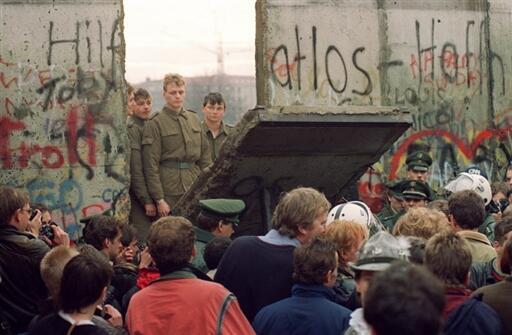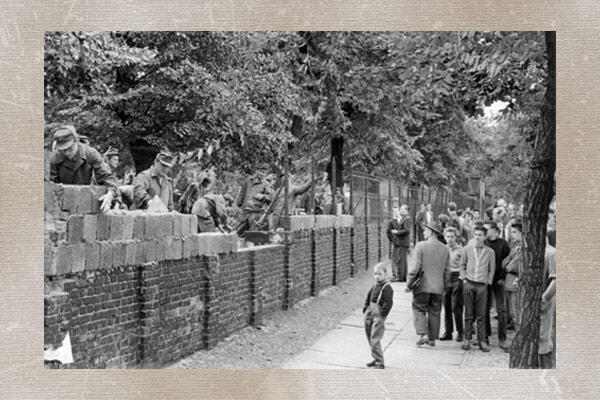The Berlin Wall fell 35 years ago, on November 9, 1989. A look back at this historical break and at the history of the GDR with an intellectual with an extraordinary biography. Born in France to anti-Nazi parents in exile, Vincent von Wroblewsky later grew up and lived in the GDR before, today, sharing his life with France.
From our correspondent in Berlin,
“ Presumed German “: when he returned for the first time to France in the 1950s, the country where he was born in 1939, the young Vincent von Wroblewsky, who had in the meantime become a citizen of the GDRcannot use an East German document, as Western countries do not recognize communist Germany. He has a passport from the Allied authorities in Berlin stamped with the words “ Presumed German » that he can travel. A mention which gave its title to the memoirs of Vincent von Wroblewsky published last year.
This stamp has a very special significance for this son of German exiles who, like many others, had to flee the Nazi regime to take refuge in France in the 1930s. My parents were under double threat in Germany, because they were communists and Jews. They took refuge in Paris where my father continued his political activities against the Nazi regime, even if official France did not receive its 25 to 30,000 people with open arms. My mother told me, for example, that she had to report to police headquarters every week. », says Vincent von Wroblewsky.
The declaration of war in September 1939 opened a dark chapter in French history for these anti-Nazis. Considered enemies, they were interned. This was also the case for nine months for Vincent von Wroblewsky’s father who was not at his wife’s side when his son was born in Clermont-Ferrand on December 21, 1939. The latter would later learn that he was born stateless, the right to obtain French nationality having been suspended by the declaration of war with Germany.
Vincent von Wroblewsky’s parents are once again in danger in the country where they fled Nazi persecution. They settled in a free zone and found refuge in Moutier-Rozeille, in Creuse. “ We were one of eight Jewish families who were hidden in this village thanks to the support of the residents. Nobody reported us. Several residents were recognized by Israel as Righteous Among the Nations for hiding Jews. » Among these protected families was also that of the French politician Jean-François Copé.
Vincent von Wroblewsky’s father joined the resistance. Like him, other Germans fought in France against the Nazi occupiers, a relatively little-known participation. Ernst von Wroblewsky died, ill, in 1944 and did not see the regime he fought capitulate a few months later.
His wife Rose must, alone, raise their two sons in a difficult period. Vincent was cared for for three months in a home in Toulouse run by a certain Golda Meir who would later become Prime Minister in Israel. She tries to convince Rose von Wroblewsky to emigrate to Palestine. The latter replies that she is a communist, but not a Zionist. She decides to return to Germany and chooses out of conviction the communist GDR which has just been created. “ It was first of all a political choice, because it rejected the post-war FRG where too many Nazis were still in charge. », remembers Vincent von Wroblewsky. The young boy spoke almost no German when he arrived in Berlin in 1950. He discovered another world: “ I sometimes had quite violent discussions with my mother and I blamed her for not staying in France. Life was radically different in a ruined Berlin, although the city offered an unusual playground. And I was something of a UFO to other kids my age. »
A city cut off for twenty-eight years »
The construction of Berlin Wall August 13, 1961 surprised Vincent von Wroblewsky in Sicily where the “presumed German” had been invited to friends: “ I didn’t think this closure would last long. In 1957, the borders had already been closed for 24 hours, but this had been temporary. I couldn’t imagine that a city could be cut off for twenty-eight years. And on the other hand, I told myself that the constant propaganda of the East German regime against the dangers of Western imperialism would lose its basis and that true socialism could develop. But the opposite happened. »
At this time, the young man began studying Romance languages and philosophy. He then worked at the Academy of Sciences of the GDR until reunification. He wrote his thesis on Jean-Paul Sartre to whom he devoted a large part of his career. Vincent von Wroblewsky took advantage of his perfect command of French and worked for decades until today as a conference interpreter. An activity which allowed him, before the fall of the Wall, to travel abroad.
“ Thanks to this activity, but also thanks to my studies, I was able to have a life where France played a very important role. In addition, there was a very special relationship between East Germany and France, more so than with other Western countries. Among those in power, there were former émigrés in France; there was also this idea, more or less mythical, of a left-wing and progressive country, marked by revolution, the Paris Commune and anti-Nazi resistance. I always had the feeling of living both inside and outside the GDR. I noticed every day all the faults of this regime while cultivating a distance which made my life more bearable. »
The end of the 1980s in the GDR was marked by a sclerosis of the communist regime which opposed the liberalization underway in the Soviet Union with the coming to power of Gorbachev. “ East German officials rejected this development and the contrast between the two countries was all the more striking. The last years of the GDR resemble a cauldron increasingly under pressure », analyzes Vincent von Wroblewsky.
Dissident circles are developing modestly, particularly within the structures of the Protestant Church. It was also at this time that some people rediscovered their Jewish roots. Vincent von Wroblewsky created a group with others in 1986. Jews close to the regime have long pushed these roots into the background. At the same time, the East German government supports the Jewish community, also to polish its international image.
Faced with internal pressures, the government is making it easier for critical voices to leave the country. Others during the last months before the fall of the Wall fled via the Czech Republic or Hungary. Vincent’s younger brother, Clément, obtained permission to leave the GDR in 1984 and settled in West Berlin.
Five years later, he rang his older brother’s doorbell in the middle of the night: “ What, you’re snoring while all of Berlin has been up for hours. Since that night, November 9, 1989, the wall has been open, remember this date! And now we’re hungry, make us some breakfast! » The story then accelerates. Vincent von Wroblewsky, a member of the East German PC, the SED, for twenty years, was elected as a delegate to a conference of the movement in December 1989. He unsuccessfully pleaded for a dissolution of the party so that the latter could take responsibility for its errors and its failure. and to enable the creation of a new democratic left movement. The proposal is rejected.
Mediator between the two countries
During these decisive weeks, the French-speaking Vincent von Wroblewsky was solicited by the French media. He is invited like others by Patrick Poivre d’Arvor while passing through Berlin and accompanies the boss of Release, Serge July, for a series of interviews.
The first free elections in the GDR, in March 1990, resulted in a massive victory for the CDU and beyond the parties which advocated rapid reunification with the West. Vincent von Wroblewsky like others, in the minority, dreamed of a third way: “ I think it would have been desirable to create a new Germany where the FRG and the GDR would have brought their positive heritage rather than imposing the model of one on the other without nuance. There were, for example, on social issues such as women’s rights, homosexual rights or abortion, more liberal provisions in the East. We could have kept part of the state ownership of the GDR by transforming companies into self-managed cooperative structures. These ideas were not accepted. Everything has been privatized or dismantled. »

With reunification and the restructuring that followed, the GDR Academy of Sciences disappeared. Vincent von Wroblewsky is staying for a few months in a research institute in the United States. He was then charged by the Rowohlt publishing house with directing the publication and translation of the works of Jean-Paul Sartre and became president of the Sartre company in Germany. In 2015, he was made a knight of the Order of Arts and Letters and was awarded this decoration at the French embassy in Berlin. “ Overall, I was very happy that the GDR with its rigid Stalinist regime and restrictions on freedoms disappeared. I think every day with gratitude of the positive changes it has brought me. Since then, I have been a free citizen, which is a huge thing for me. I often have the impression that those who grew up in the West and have always known these living conditions do not know how to properly appreciate them. My hope in 1990 has come true. I feel and consider myself today as a European and a citizen of the world. »
Vincent von Wroblewsky, who now shares his life between Germany and France, even has a Vitale card for his social security coverage in France. In the accompanying letter, the stateless child born in France, later described as “presumed German”, was given the title of “permanent migrant”. Quite a symbol for this mediator between the two countries.
Also readBerlin Wall: from its construction to its fall, the key dates
